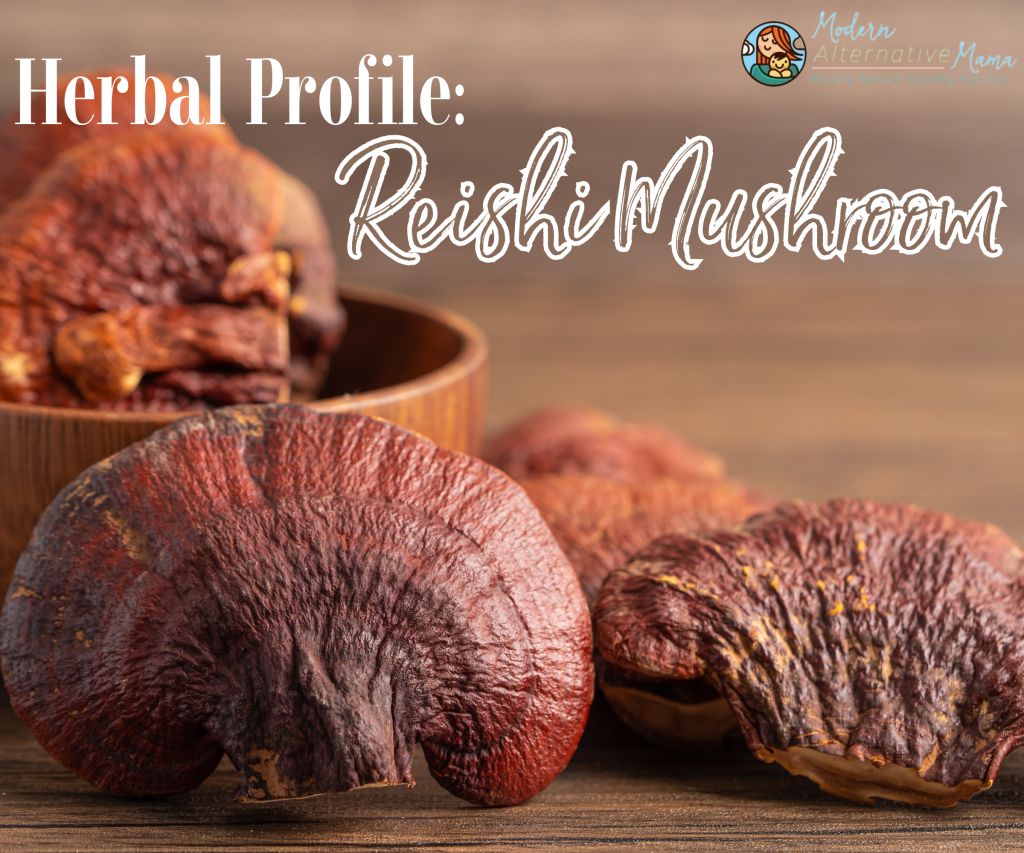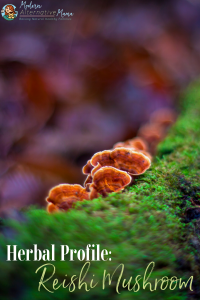What is Reishi Mushroom
Reishi mushroom is sometimes known as ling-zhi, ling chih, ling chi mushroom, or their scientific name is Ganoderma lucidum. Many species of Ganoderma are referred to as reishi. They can be identified by what they’re growing on. Reishi mushrooms are saprotrophic, meaning they feed off dead organic matter, such as a dead or dying tree, old stumps, or logs. Their caps are reddish, resembling a kidney (1).
Health Benefits of Reishi Mushroom
In Chinese medicine, reishi is known as the mushroom of immortality, likely because of its many health benefits, such as:
Rich in Nutrients
Our body needs nutrients to flourish. Without vital vitamins and minerals, our bodies won’t function properly. Reishi mushrooms are known for their contents of vitamins and minerals. Reishi contains B1, B2, B3, B6, and C, as well as potassium, phosphorus, sulfur, magnesium, copper, manganese, iron, zinc, and more (2).
Antioxidant Properties
Antioxidants can help fight damage from harmful free radicals. The buildup of free radicals has been linked to chronic diseases, such as cancer and heart disease (3). Studies have found that reishi mushrooms’ phenolic content is positively associated with antioxidant activity (4). Another study found reishi mushrooms had antioxidant, antitumor, antimicrobial, and antiacetylcholinesterase effects in vitro and in vivo (5).
Anti-Inflammatory Properties
Chronic inflammation has been linked with many diseases, such as type 2 diabetes, asthma, and certain cancers (6). Reishi mushrooms have anti-inflammatory properties. An older study found that reishi mushrooms release several inflammatory cytokines while inhibiting others. They concluded reishi mushroom extracts might be relevant for clinical use for inflammatory diseases, including endotoxemia or sepsis (7).
A more recent study review demonstrated reishi mushrooms’ high anti-inflammatory metabolites in medical applications of unpurified extract and extra pure compounds. They concluded that reishi mushrooms could be used as safe and natural active ingredients in cosmeceutical products without undesired side effects (8).
May Improve Mental Health
Worldwide, 970 million people struggle with mental health, resulting in approximately 8 million deaths annually, accounting for 14.3% of worldwide deaths (9). Thankfully, reishi mushrooms may help improve mental health. One study found four weeks of a reishi powder supplement reduced fatigue, anxiety, and depression and improved quality of life in breast cancer patients (10). Another study found after eight weeks, reishi mushroom supplementation reduced fatigue and improved overall well-being in people with neurasthenia (11).
May Support the Immune System
The immune system protects the body from outside invaders, such as bacteria, viruses, fungi, and other toxins (12). When you support your immune system, you can support your body’s ability to fight off sickness. Several studies demonstrate reishi mushrooms’ ability to support and boost the immune system (13). Some studies found some variations of reishi mushrooms alter inflammation pathways in white blood cells. In contrast, other studies show they can increase the number of white blood cells in colorectal cancer patients (14,15). Other studies indicate that reishi mushrooms improve lymphocyte function in athletes exposed to stressful conditions (16). Improved lymphocyte function helps fight infections and cancer (17).
May Support Heart Health
Unfortunately, heart disease is the world’s number 1 cause of death (18). Due to the incredibly complex determinants of heart disease and various possible contributions, it’s hard to pinpoint an exact way to prevent it. Still, you can at least take steps to lower your overall risk. That’s where reishi mushroom may come into play.
Components from reishi mushrooms have been identified with lipid-lowering and antihypertensive effects, and compounds with specific mechanisms of action have been isolated (19). Older studies demonstrated a slight trend toward lower lipid levels, which was not statistically significant (20). Contrarily, more recent studies have found rishi mushrooms may help increase HDL (good) cholesterol and decrease triglycerides (21).
May Support Liver Health
The liver is the largest internal organ, responsible for over 500 vital functions like bile production, detoxification, production and regulation of vital bodily processes, and more (22). When the liver becomes overburdened, it may become congested or result in liver disease. Thankfully, reishi mushrooms can help improve liver function and prevent liver disease. For instance, one study found that reishi mushrooms positively affected acute liver injury (23). These benefits likely stem from their antioxidant properties that fight harmful immune responses that slow liver function.
May Help Manage Blood Sugar Levels
As of 2020, 34.2 million (1 in 10) Americans have diabetes, and another 88 million (1 in 3) Americans have prediabetes (24). Reishi mushrooms may help lower these numbers. Although one study found reishi mushroom supplementation did not affect fasting blood sugar or hemoglobin A1c (25), other studies have. For instance, several animal and human studies show that certain compounds in reishi mushrooms could decrease blood sugar levels (26,27,28).
May Help Balance Hormones
Hormones are responsible for various functions in your body. Hormones carry messages through your blood to your organs, skin, muscles, and other tissues. These messages tell your body what to do and when to do it and are essential for life and optimal health (29). Unfortunately, about 80% of women suffer from hormonal imbalances resulting in physical and mental health challenges (30).
Thankfully, reishi mushroom may help. One study found reishi mushroom extract could help normalize levels of certain receptor hormones, which may be beneficial in treating certain cancers (31). Cancer aside, one study found that reishi mushrooms inhibit an enzyme called 5-alpha-reductase, which converts existing testosterone into a byproduct called dihydrotestosterone or DHT (32). Another study demonstrated reishi mushrooms’ ability to protect and positively impact the endocrine system (33).
Anticancer Properties
In the United States, cancer is responsible for 600,00 deaths annually, 1 in 3 people will have cancer in their lifetime, and 1.7 million people are diagnosed annually (34). But what if these numbers didn’t have to keep growing, and a simple supplement may be the key? That’s where reishi may be beneficial.
Reishi mushroom has potential anticancer properties (35,36). In several test-tube studies, reishi mushroom has displayed the ability to kill cancer cells (37,38,39). More specifically, studies have found reishi mushroom beneficial for prostate and colorectal cancers (40,41,42). Additionally, a study review revealed that reishi mushrooms, alongside traditional treatment, could increase white blood cell activity and improve the quality of life for cancer patients (43).
Safety Concerns
Mainstream sources recommend avoiding reishi mushroom if you are pregnant or breastfeeding, claiming there haven’t been enough studies on its safety in these circumstances. These sources also claim taking reishi mushrooms if you have low blood pressure or are taking therapy to raise your blood pressure, are taking diabetes medications, or have immune system disorders or medications, may be risky (44).
Contrarily, trusted herbalist Richard Whelan considers reishi mushrooms an extremely safe herb that may be taken in high doses when needed by the young or old, during pregnancy, or while breastfeeding. Richard Whelan States:
“If you look at the literature on the Internet you will see cautions for people using anti-coagulant (blood thinning) medicine whilst using Reishi as it likewise reduces blood stickiness — my advice in this regard is of course to continue to use the herb but get your clotting levels checked frequently and if you need to use less drugs to get your blood to the optimal level then that’s great!
Reishi is clearly a potent immune modulator therefore you will also see a number of cautions or warning against using it whilst taking immune-suppressant drugs or if suffering from an auto-immune condition. Please note that these concerns are theoretical, not based on actual adverse events, and in my own experience it is one of the safest of all agents you can give to a person with a disordered immune system and is one of the first herbs I think of when we need to tread very carefully indeed (45).”
How to Use Reishi Mushroom
You can find reishi mushrooms in dried bulk, pills, powders, extracts, or tinctures. Tinctures always contain the most concentrated amount of herbs. Teas and soups are also options, especially when following Ayurvedic medicine recipes. If you’re a DIY person, some great starter recipes are:
Follow the recommendations of any supplement; some of my recommendations include:
- Earthley’s 5-Mushroom Super Blend Capsules support the brain and immune system. Mushrooms have been shown to enhance cognitive functions like learning and memory, while also aiding in support against symptoms of depression, anxiety, stress, neurological disorders, and more. Our chosen superstar mushrooms are high in anti-inflammatory and antioxidant properties to improve immunity and overall health.
- Earthley’s Healthy Heart is an herbal supplement that supports the heart and a proper immune response. This tincture is rich in anti-inflammatory properties and vitamin C. It can help lower blood sugar and blood pressure, increase insulin activity, and even help with symptoms of type 2 diabetes. Naturally, nourish your heart and body with the power of herbs!
- Earthley’s Master Tonic is perfect for total body support when life gets too busy. If you’re feeling run down and need support, Master Tonic is here for you! This herbal remedy has nutrients to support all your major organs that need help when you’re overworked.
Disclaimer: This post is not intended as medical advice. These statements have not been evaluated by the FDA, and nothing in this post is intended to diagnose, treat, or cure anything. If you have questions, please do your own research or seek advice from a health professional.







